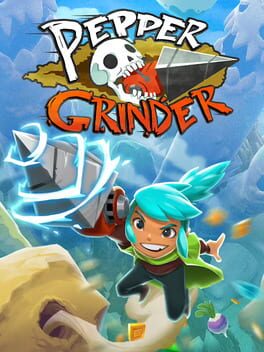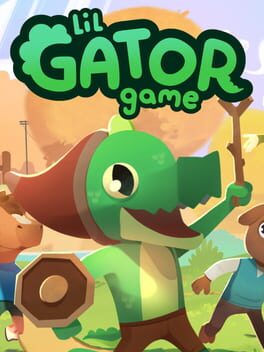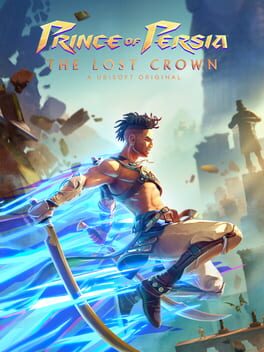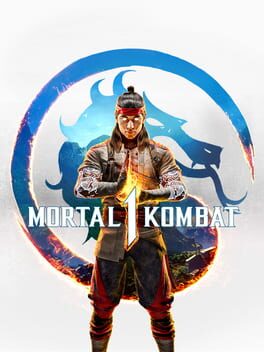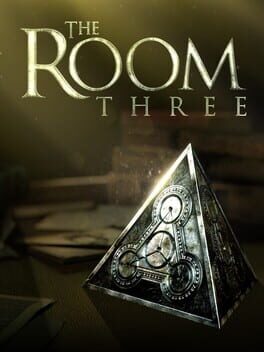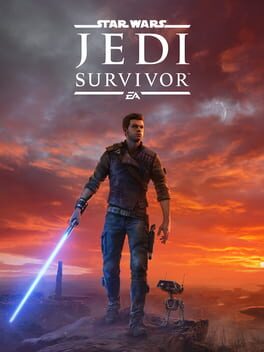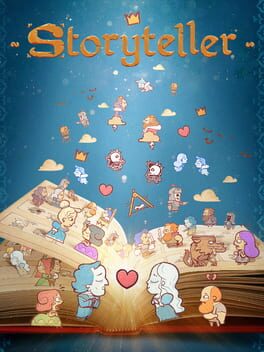ipcoleman
30 reviews liked by ipcoleman
Pepper Grinder
2024
Pepper Grinder
2024
Lil Gator Game
2022
Completely charming. The writing is hilarious and feel good while avoiding schmaltz, reminding me a bit of the humor in Frog Detective except a little less “lol random.” It captures a child-like sense of play so well, with grown-up responsibility peeking through at times to ground it in a sense of reality.
It also bests Frog Detective for me by having gameplay that steers well clear of ever just being a tedious vehicle for its writing. Instead, it’s similar to A Short Hike’s concise distillation of Breath of the Wild’s open-world brilliance. Lil Gator Game is slightly less minimalist compared to A Short Hike, which I appreciated but wouldn’t say was strictly good or bad; overall its a pleasantly similar experience.
It also bests Frog Detective for me by having gameplay that steers well clear of ever just being a tedious vehicle for its writing. Instead, it’s similar to A Short Hike’s concise distillation of Breath of the Wild’s open-world brilliance. Lil Gator Game is slightly less minimalist compared to A Short Hike, which I appreciated but wouldn’t say was strictly good or bad; overall its a pleasantly similar experience.
A great surprise and one of the best metroidvanias in a while. The traversal skill set is a nice mix of the familiar and the new, both in what you get to do and how you control it; “phase changing” with a stick click during platforming segments is particularly novel in how it asks you to pat your head while you rub your stomach. The optional platform challenges are nice in how they often look truly intimidating but are usually conquerable pretty quick without devolving into tedious retries. It feels great every time you nail one the first time through.
The Persian-themed environments that get traversed are thoughtfully detailed, and each area is distinct enough in appearance and threat type to stay interesting through the substantial playtime. The story is solid as well, evoking a lot through its occasional cut scenes and a memorable cast. The routine combat is satisfying and deeper than expected, though found the boss fights more stressful than fun.
The Persian-themed environments that get traversed are thoughtfully detailed, and each area is distinct enough in appearance and threat type to stay interesting through the substantial playtime. The story is solid as well, evoking a lot through its occasional cut scenes and a memorable cast. The routine combat is satisfying and deeper than expected, though found the boss fights more stressful than fun.
Mortal Kombat 1
2023
I played this as a single player game, which likely isn’t how it’ll be experienced by its biggest fans, but it’s still a fun time outside of the online versus mode. The moves feel easy enough to pick up and satisfying to pull off, and there’s apparent depth for anyone interested.
Visually, this is by far the most high fidelity fighting game I’ve ever played, with environments and character designs that are richly detailed in addition to often looking photorealistic. The facial animation in the “kampaign” cinematics is astounding, though the performances are mostly amateur enough that capturing every little nuance is often more distracting than affecting.
The plot is nostalgically reconstructing the backstory of the early games (again), especially MK2 and 3, and that’s entertaining for a while, if also long-winded. Eventually, though, it collapses into the same halfhearted gesturing at multiverse nonsense that so many big branded stories default to right now. The dialogue is also generally bad, not just in a hammy way, but in an “I can finish half the lines myself because they’re that tired and recycled” way.
Beyond the story mode, there’s the usual arcade tower with character endings, plus a time-sink seasons mode that seems like an okay carrot to keep solo players interested but also way too much of a service game/MTX store grind to grab me more than the couple of intro hours I tried.
Visually, this is by far the most high fidelity fighting game I’ve ever played, with environments and character designs that are richly detailed in addition to often looking photorealistic. The facial animation in the “kampaign” cinematics is astounding, though the performances are mostly amateur enough that capturing every little nuance is often more distracting than affecting.
The plot is nostalgically reconstructing the backstory of the early games (again), especially MK2 and 3, and that’s entertaining for a while, if also long-winded. Eventually, though, it collapses into the same halfhearted gesturing at multiverse nonsense that so many big branded stories default to right now. The dialogue is also generally bad, not just in a hammy way, but in an “I can finish half the lines myself because they’re that tired and recycled” way.
Beyond the story mode, there’s the usual arcade tower with character endings, plus a time-sink seasons mode that seems like an okay carrot to keep solo players interested but also way too much of a service game/MTX store grind to grab me more than the couple of intro hours I tried.
The Room Three
2015
The puzzle boxes and the environments they’re placed within are impressively intuitive to stumble through without ever feeling too stumping or too simple. Those environments have a nice eldritch theming that’s evocative without being too overbearing. The upgraded visuals of the PC version were nice, but I might try to play more of this series on a tablet with touch controls; seems like it might make the puzzles boxes feel even more tactile than they already do with a mouse.
An incredible experience, eventually, with highs and lows I haven’t experienced in any other game in a long while. I’ve also never particularly cared either way about mechs, and by the end of NG++ I was shocked to find myself fiddling with part selection for reasons other than pure effectiveness, and even applying custom paint and decals.
But…this is also a reminder that (after more than a decade of being comfortable with Souls games) learning how to have fun with a completely new type of From Software game can be miserable and infuriating for a long while. Sure, there were new quirks and challenges in the Dark Souls sequels/Bloodborne/Sekiro/Elden Ring, but “gitting gud” with the first one let me know how to do the same with the rest of them from their starts.
I went in to AC6 expecting something similar, only to find an opaque game language that offered no apparent help explaining why it was punishing me. I played it on rental, and during my first playthrough I nearly uninstalled+returned it at the initial helicopter boss, at BALTEUS, at CEL 240, and at the final boss for the Fires ending. Following what seems to be the experience for a lot of novice players, it was only discovering the gatlings+lasers tank build online that got me through BALTEUS and then mostly carried me through to the final boss. Swapping to the tank’s sludgy movement felt way less fun, but it was also a trap, effectively letting me opt for a damage race against strong enemies that the tank’s beefy life bar could consistently win, until the final boss flipped that plan on its head. I was left hopeless to figure out an entire playthrough’s slow skill gains all at once if I wanted to finish.
I eventually beat it, using a heavy but bipedal build whose “better than a tank” maneuverability tempted me into starting a second playthrough, which turned out to be easy enough until round 2 with CEL 240, where I again got close to calling it done. This time, the thing that hung me up was not realizing how strong hard-locking can be if you never mess with the camera. That’s an insanely basic game feel thing to let slip by players until the end of NG+! There’s so many similarly subtle stat and game feel concepts that can make this game feel awful and unresponsive until enough of it clicked in my head. Once that happened, though, the mechs are an absolute joy to pilot.
The story followed a similar trajectory for me. Initially it’s a half-assed seeming word salad of factions and pilot names, with basically nothing coherent aside from the broadest plot strokes. It’s also much more foregrounded than the evocative (but ignorable) storytelling I was used to from Souls games, which made its incomprehensibility more annoying. And then, slowly, during NG+ and especially NG++, the emotional stakes and interpersonal drama made itself clear and I found myself shocked to be charmed and emotionally invested in most of the cast.
Great game, and I look forward to having a consistently fun time with AC7+.
But…this is also a reminder that (after more than a decade of being comfortable with Souls games) learning how to have fun with a completely new type of From Software game can be miserable and infuriating for a long while. Sure, there were new quirks and challenges in the Dark Souls sequels/Bloodborne/Sekiro/Elden Ring, but “gitting gud” with the first one let me know how to do the same with the rest of them from their starts.
I went in to AC6 expecting something similar, only to find an opaque game language that offered no apparent help explaining why it was punishing me. I played it on rental, and during my first playthrough I nearly uninstalled+returned it at the initial helicopter boss, at BALTEUS, at CEL 240, and at the final boss for the Fires ending. Following what seems to be the experience for a lot of novice players, it was only discovering the gatlings+lasers tank build online that got me through BALTEUS and then mostly carried me through to the final boss. Swapping to the tank’s sludgy movement felt way less fun, but it was also a trap, effectively letting me opt for a damage race against strong enemies that the tank’s beefy life bar could consistently win, until the final boss flipped that plan on its head. I was left hopeless to figure out an entire playthrough’s slow skill gains all at once if I wanted to finish.
I eventually beat it, using a heavy but bipedal build whose “better than a tank” maneuverability tempted me into starting a second playthrough, which turned out to be easy enough until round 2 with CEL 240, where I again got close to calling it done. This time, the thing that hung me up was not realizing how strong hard-locking can be if you never mess with the camera. That’s an insanely basic game feel thing to let slip by players until the end of NG+! There’s so many similarly subtle stat and game feel concepts that can make this game feel awful and unresponsive until enough of it clicked in my head. Once that happened, though, the mechs are an absolute joy to pilot.
The story followed a similar trajectory for me. Initially it’s a half-assed seeming word salad of factions and pilot names, with basically nothing coherent aside from the broadest plot strokes. It’s also much more foregrounded than the evocative (but ignorable) storytelling I was used to from Souls games, which made its incomprehensibility more annoying. And then, slowly, during NG+ and especially NG++, the emotional stakes and interpersonal drama made itself clear and I found myself shocked to be charmed and emotionally invested in most of the cast.
Great game, and I look forward to having a consistently fun time with AC7+.
This is mindlessly pleasant for broad sections and competently includes familiar feeling Star Wars sights and sounds as well as a glutted mishmash of open-world action RPG systems you’ve seen in better games before. It’s a decent enough version of this sort of big budget IP-laden game, but it really pales in comparison to Spider-man 2 and it’s a shame I played that immediately before this.
And wow does it need to be edited down to about half its size (something it could learn from Spidey 2). There’s so many little systems and collectibles that feels included for reasons that aren’t “they’re consistently fun and fresh to complete.” There are so many boring collectibles dotted around in obvious and stupid locations; oh no, a T-branch in a hallway…guess it’s time to figure out which way is the advancing path so I can run to the end of the other path first to collect a shiny bit of nothing!
This is also a shockingly rough game technically (on PS5, not even the poorly regarded PC version). It hurts immersion so much to see the graphics oftentimes quickly painting themselves into place when coming out of the map+menu screens, to say nothing of how many times I got stuck in or under level geometry glitches, and ran into several occurrences where the textures seemingly all got dumped and left me in a black wire-framed void for several seconds. Worse than graphics stuff are the narrow strictures on intended traversal in a game that asks you to explore its environment using an air dash and double jump and gliders. Oops, you managed to get to a ledge for a collectible we didn’t intend on yet and you haven’t stopped at a save point in a while? Well, guess who’s stuck until they kill themselves from fall damage and lose progress! I’m not the sort of player who thinks about or attempts sequence breaking, and I stumbled into four separate occurrences here without meaning to. That could be neat if progression didn’t feel so tightly authored, but instead it always left me feeling anxious wondering what buggy nuisance I’d run into since I’d wandered out of the intended experience.
And wow does it need to be edited down to about half its size (something it could learn from Spidey 2). There’s so many little systems and collectibles that feels included for reasons that aren’t “they’re consistently fun and fresh to complete.” There are so many boring collectibles dotted around in obvious and stupid locations; oh no, a T-branch in a hallway…guess it’s time to figure out which way is the advancing path so I can run to the end of the other path first to collect a shiny bit of nothing!
This is also a shockingly rough game technically (on PS5, not even the poorly regarded PC version). It hurts immersion so much to see the graphics oftentimes quickly painting themselves into place when coming out of the map+menu screens, to say nothing of how many times I got stuck in or under level geometry glitches, and ran into several occurrences where the textures seemingly all got dumped and left me in a black wire-framed void for several seconds. Worse than graphics stuff are the narrow strictures on intended traversal in a game that asks you to explore its environment using an air dash and double jump and gliders. Oops, you managed to get to a ledge for a collectible we didn’t intend on yet and you haven’t stopped at a save point in a while? Well, guess who’s stuck until they kill themselves from fall damage and lose progress! I’m not the sort of player who thinks about or attempts sequence breaking, and I stumbled into four separate occurrences here without meaning to. That could be neat if progression didn’t feel so tightly authored, but instead it always left me feeling anxious wondering what buggy nuisance I’d run into since I’d wandered out of the intended experience.
Storyteller
2023
A whimsically entertaining toy box recreating and remixing a lot of classic literary stories and tropes. The puzzle prompts are just vague enough to make solving them feel satisfying, but rarely stumping. Its literary allusions and the jokes it makes with them are sophisticated enough to feel rewarding to pick up on, but still very familiar overall; the resolution to Nietzsche’s first appearance was particularly funny and on-the-nose. The animation while swapping out various actors and scenes is charming, and its technical seamlessness makes experimenting feel frictionless. That’s especially helpful during the epilogue’s bonus chapters and stamp challenges, as focused as they are on mischievously recasting prior chapters in a new light.
This is also the perfect sort of game for Netflix to offer on mobile and I’m glad they did. It’s rewarding to play even just for a few minutes, great with touch controls, and its brief overall playtime isn’t a value consideration when it comes with an existing subscription.
This is also the perfect sort of game for Netflix to offer on mobile and I’m glad they did. It’s rewarding to play even just for a few minutes, great with touch controls, and its brief overall playtime isn’t a value consideration when it comes with an existing subscription.
Cocoon
2023
Brilliantly clever level design set in a truly imaginative alien environment; each of its varied low-poly aesthetics is beautiful. The nested “worlds-within-worlds” concept could be imposing and prone to stumping, but they’re smart to constantly constrain the active puzzle space to manageable bounds so I never felt overwhelmed with recursive spatial possibility, but still felt rewarded upon each delayed epiphany.
(On a side note, wow does Cocoon make Somerville look even more unfortunate in retrospect. They’re attempting broadly similar iterations on the aesthetics and gameplay of Limbo+Inside, but Cocoon feels like it came to all the right decisions while Somerville got mired in all the wrong ones and never figured out how to fix itself.)
(On a side note, wow does Cocoon make Somerville look even more unfortunate in retrospect. They’re attempting broadly similar iterations on the aesthetics and gameplay of Limbo+Inside, but Cocoon feels like it came to all the right decisions while Somerville got mired in all the wrong ones and never figured out how to fix itself.)
